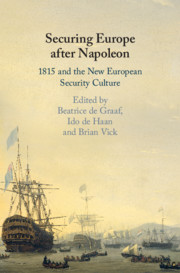(image source: CUP)
Book abstract:
After the French Revolution and the Napoleonic Wars, the leaders of Europe at the Congress of Vienna aimed to establish a new balance of power. The settlement established in 1815 ushered in the emergence of a genuinely European security culture. In this volume, leading historians offer new insights into the military cooperation, ambassadorial conferences, transnational police networks, and international commissions that helped produce stability. They delve into the lives of diplomats, ministers, police officers and bankers, and many others who were concerned with peace and security on and beyond the European continent. This volume is a crucial contribution to the debates on securitisation and security cultures emerging in response to threats to the international orderOn the editors:
Beatrice de Graaf, Universiteit Utrecht, The Netherlands Beatrice de Graaf is Professor of History of International Relations and Global Governance at Universiteit Utrecht, The Netherlands. She leads an ERC project on security history in Europe and beyond, is an expert on history of terrorism, and is a member of the Royal Netherlands Academy of Arts and Sciences and the ECFR. Ido de Haan, Universiteit Utrecht, The Netherlands Ido de Haan is Professor of Political History at Universiteit Utrecht, The Netherlands. He has written extensively about the aftermath of war and collective violence in modern European history, notably after the Napoleonic Wars and the Holocaust. Brian Vick, Emory University, Atlanta Brian Vick is Professor of History at Emory University, aTLANTA. He has written widely on the Congress of Vienna and its aftermath. His book The Congress of Vienna: Power and Politics After Napoleon (2014) won the Hans Rosenberg Book Prize of the Central European History Society of the American Historical Association.Table of contents:
Vienna 1815: introducing a European security culture Beatrice de Graaf, Ido De Haan and Brian Vick Part I. Conceptualisations: 1. Cultures of peace and security from the Vienna Congress to the twenty-first century: characteristics and dilemmas Matthias Schulz; 2. Historicising a security culture: peace, security and the Vienna system in history and politics, 1815 to present Eckart Conze; 3. The Congress of Vienna as a missed opportunity: conservative visions of a new European order after Napoleon Matthijs Lok; Part II. Interests: 4. The Central Commission for Navigation of the Rhine: a first step towards European economic security? Joep Schenk; 5. From the balance of power to a balance of diplomacy? Peace and security in the Vienna settlement Stella Ghervas; 6. The London Ambassadors' Conferences and beyond: abolition, Barbary corsairs and multilateral security in the Congress of Vienna system Brian Vick; 7. The allied machine: the Conference of Ministers in Paris and the management of security, 1815–18 Beatrice De Graaf; 8. The German Confederation: cornerstone of the new European security system Wolf D. Gruner; Part III. Threats: 9. Constructing an international conspiracy: revolutionary concertation and police networks in the European restoration Ido De Haan and Jeroen Van Zanten; 10. Security and transnational policing of political subversion and international crime in the German confederation after 1815 Karl Härter; 11. The papacy, reform, and intervention: international collective security in restoration Italy David Laven; 12. From Augarten to Algiers: securitising and 'piracy' around the Congress of Vienna Erik De Lange; Part IV. Agents and Practices: 13. Friedrich Von Gentz and his Wallachian correspondents: security concerns in a Southeastern European Borderland (1812–28) Constantin Ardeleanu; 14. Diplomats as power brokers Mark Jarrett; 15. Economic insecurity, 'securities' and a European security culture after the Napoleonic wars Glenda Sluga.
Read more with CUP.

